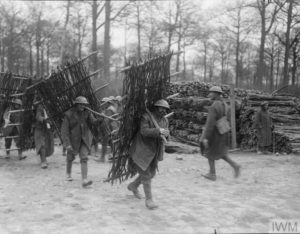Monday July 15th, 1918
Raining hard. Orderly room for eating Bully. CO gives us 14 days CC [Confined to Camp] – thanks awfully! Work on aircraft defence slits. Rained very hard in night. Mail up about nine from home. Latest dated July 12th – good. Wrote home.
Confined to Camp
Interestingly, Frank hasn’t mentioned food or being hungry for some time. However, today he has been caught and punished for eating an extra, unauthorized can of Bully Beef. His punishment is 14 days confined to camp and extra fatigues. He sounds more put out than ashamed.
The Charge
Under the Army Act, section 18, ‘(4.) Steals or embezzles or receives, knowing them to be stolen or embezzled, any money or goods the property of a comrade or of an officer, or any money or goods belonging to any regimental mess or band, or to any regimental institution, or any public money or goods’ ¹
According to the ‘Manual of Military Law’ and some research on the process for trying crimes and misdemeanours in the Canadian Forces², it is clear that theft or theft of public property could result in a court martial. In Frank’s case, he is subject to summary trial by the Commanding Officer and found guilty.
The Punishment

Frank was subject to a form of ‘Field Punishment’. This is a general term used to describe any form of punishment used against military personnel in the field rather than being incarcerated in a military prison.
There was a hierarchy of Field Punishment in the British Army that was introduced in 1881 when flogging was abolished. We will look at Field Punishment Numbers 1 and 2 in future posts – in both cases these included shackles, loss of pay and extra fatigues.
In Frank’s case, he was not tied up in any way. However he was sentenced to 14 days of additional fatigues. It is unclear whether or not his pay was suspended or cut.
The photograph shows a fatigue-party fetching revetting hurdles³ from a dump near Steenvorde, 15th April 1918.*
Through the bravado, it is difficult to recognize the Salvationist who sailed from Marseilles just over seven months ago.
13th (Service) Battalion War Diary – 15th July 1918 – Abancourt, France
All men bathing at Abancourt. Only other parade one hour digging slits. 4 OR on leave.
References & Further Reading
¹ Manual of Military Law, The War Office, 1914, page 387
² Researching Canadian Soldiers of WWI, Part 15, Crime by Michael O’Leary, the Regimental Rogue
³ In military engineering, revetting hurdles are structures, sloped, formed to secure an area from artillery, bombing, or stored explosives (source Wikipedia)
* Q10904, copyright Imperial War Museums


